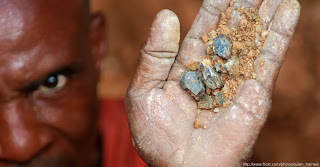Economics Blog #5 (Bonus)
By: Alisha Tupchong
‘High-Grade’ Uranium Deposit at Saskatchewan Mine
Summary of the EventDenison Mines Corp., a Canadian public company that invests in and produces uranium, has confirmed that one of its drilling locations in Saskatchewan has the potential of “an economically significant, high-grade uranium deposit.” Uranium is a natural metal that is used extensively for providing energy to nuclear power plants because of its high energy potential and efficiency. One drilling area in Saskatchewan, called Zone A, has the potential to contain between 40 million and 80 million pounds of uranium, while another one, Zone B, may contain between 5 and 15 million pounds, as estimated by Denison Mines Corp. Within the last decade, uranium prices have continuously risen, and because uranium is in fact a very inelastic product, the increased prices have not affected the demand whatsoever. Canada is the largest uranium producer in the world, responsible for nearly 28 percent of the world’s production in 2005.
3 Positive Economic StatementsIf Canada continues to have an absolute advantage in uranium production and the demand for uranium remains high, Canadian companies that mine for uranium will remain successful and Canada will have good trading relations with other countries that require uranium and supply goods to Canada that Canada would not otherwise be able to produce.
If the demand for uranium increases while its scarcity increases, Canadian uranium-mining companies will hire more workers to increase its production levels to satisfy the demand in the economy, resulting in a lower national unemployment rate and therefore lower a welfare-dependence rate, which in turn lowers government-spending costs.
If the demand for uranium increases, then Canada will have to export more uranium, which will increase the exchange rate, since exchange rates are determined by the demand for and supply of currencies on the foreign exchange market; with increased demand for uranium, countries will have to purchase more Canadian dollars, therefore increasing the exchange rate.
2 Normative StatementsCanada should invest in uranium production because uranium has the potential to positively affect the Canadian economy, since uranium will continue to be in high demand due to its importance in nuclear power plants.
Canadian uranium-mining companies should set up mines in other countries where uranium is also prevalent, so that the uranium is not coming from a singular source, Canada.
Opinion About What Should HappenCanada should invest in uranium production because uranium is a natural resource that is abundant in Canada, whereas it is not as abundant in other countries. Eventually, Canada will be one of the only countries to produce uranium; therefore its scarcity will increase prices dramatically, allowing Canadian companies to profit greatly. It is particularly strategic to invest in uranium production because uranium is a highly inelastic product. In other words, an increase in price levels does not significantly alter the quantity demanded. Although there are four factors that affect elasticity (availability of substitutes, fraction of income spent on the item, amount of time available, and the nature of the item), it is singularly the nature of the item that is the reason why uranium is inelastic. Uranium is highly sought after because of its importance in nuclear power plants. Uranium is very effective and efficient, causing it to be environmentally-friendly because it provides lasting energy. With global warming and other environmental issues becoming increasingly pressing concerns, companies are turning to energy-efficient products for use in manufacturing, and uranium is one of them. Therefore, the demand for uranium will remain high, making it a wise choice to invest in. When Canada becomes one of the only countries containing uranium, demand will increase because of scarcity, causing Canadian companies to hire more workers. This will lower the national unemployment rate and increase GDP, both benefitting the Canadian economy.
Works Cited"Denison drilling program confirms 'high-grade' deposit at Saskatchewan mine." The Canadian Press. Google News, 19 Jan. 2010. Web. 19 Jan. 2010.
.
"Denison Mines: Fact Sheet." Denison Mines Corp. Web. 19 Jan. 2010. .




